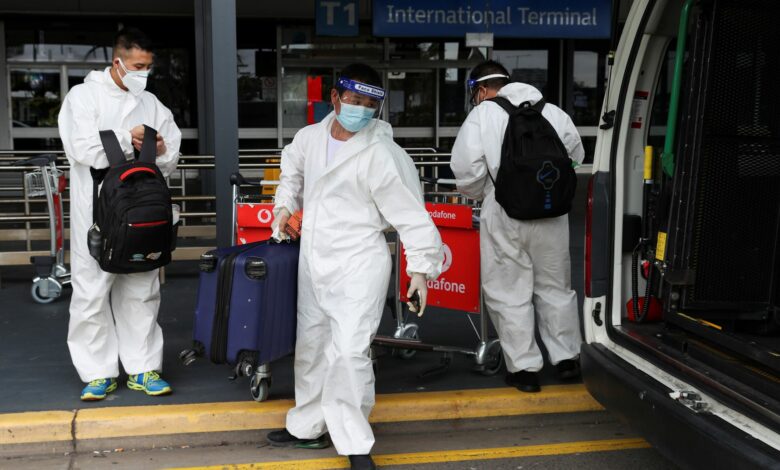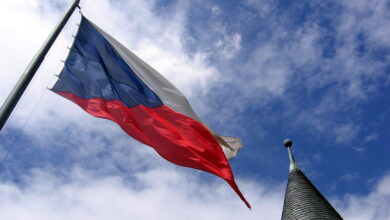
LONDON, Dec 21 (Reuters) – Countries across Europe were considering new curbs on movement on Tuesday, with German scientists urging maximum and immediate restrictions on social contacts as the Omicron variant swept the world days before the second Christmas of the pandemic.
Omicron infections are multiplying across Europe, the United States and Asia, including in Japan, where a single cluster at a military base has grown to at least 180 cases.
Germany, Ireland, the Netherlands and South Korea are among countries to have reimposed partial or full lockdowns or other social distancing measures, in recent days. read more
New Zealand COVID-19 Response Minister Chris Hipkins said his country, which imposed some of the world’s toughest COVID-19 measures, was delaying the start of a staggered reopening of its border until the end of February.
“All of the evidence so far points to Omicron being the most transmissible COVID-19 variant yet,” he said.
Germany’s Robert Koch Institute for infectious diseases on Tuesday recommended that “maximum contact restrictions” be imposed at once.
Federal and state leaders were due to meet later in the day to decide on new measures, which were likely to include contact restrictions even for the vaccinated and those who have recovered from an infection, but a nationwide lockdown seemed to be off the cards. read more
British Prime Minister Boris Johnson said on Monday he was looking at all kinds of measures to keep Omicron under control.
Finance minister Rishi Sunak announced 1 billion pounds ($1.3 billion) of extra support for businesses hit hardest by Omicron, which is hammering the hospitality sector and other businesses. read more
He said he was confident the measures would help hundreds of thousands of businesses. But he added that he would “respond proportionately and appropriately” if the government were to impose further restrictions to slow Omicron, which would further hit the economy.
Sweden will urge all employees to work from home if possible and impose tighter rules for social distancing. In neighbouring Denmark, Omicron is now the predominant variant, Health Minister Magnus Heunicke said.
Many countries in the West are pinning their hopes on third, booster vaccine shots to keep the new variant at bay amid reports that two shots may not be enough.
The European Union’s drug regulator is prepared for the possibility that vaccines may have to be tweaked to fight Omicron, although there is no evidence yet, the agency’s chief said. read more
“There is no answer whether we will need to adapt vaccines,” European Medicines Agency executive director Emer Cook said.
‘WE’RE NOT GOING BACK TO LOCKDOWNS’
Omicron has hit financial markets hard in recent days, raising investor fears for the global economic recovery as the pandemic cuts travel and seizes up supply chains.
But world shares gained on Tuesday, with the dollar softening as appetite for riskier assets made a cautious return. The broader Euro STOXX 600 (.STOXX) rose 1.2%. Germany’s DAX’s (.GDAXI) added 1.13%, with London’s FTSE (.FTSE) climbing 1.02%.
In Australia, where Omicron cases have surged but hospitalisations remain relatively low, Prime Minister Scott Morrison urged state and territory leaders to avoid further lockdowns. read more
“We’re not going back to lockdowns. We’re going forward to live with this virus with common sense and responsibility,” he said.
In the United States, the Biden administration said it would open federal COVID-19 testing sites in New York this week and buy 500 million at-home rapid tests that Americans can order online for free. read more
Omicron now accounts for 73% of all new cases in the United States, up from less than 1% at the beginning of the month.
“We will also note that if you are unvaccinated, you are at high risk of getting sick,” a senior administration official said. “This variant is highly transmissible and the unvaccinated are eight times more likely to be hospitalized and 14 times more likely to die from COVID.”
The Omicron variant was first detected last month in southern Africa and Hong Kong and so far has been reported in at least 89 countries.
The severity of illness it causes remains unclear, but the World Health Organization warned it is spreading faster than the Delta variant and is causing infections in people already vaccinated or who have recovered from the COVID-19 disease. read more
More than 274 million people have been reported to be infected by the coronavirus globally since the pandemic began nearly two years ago. More than 5.65 million people have died.




